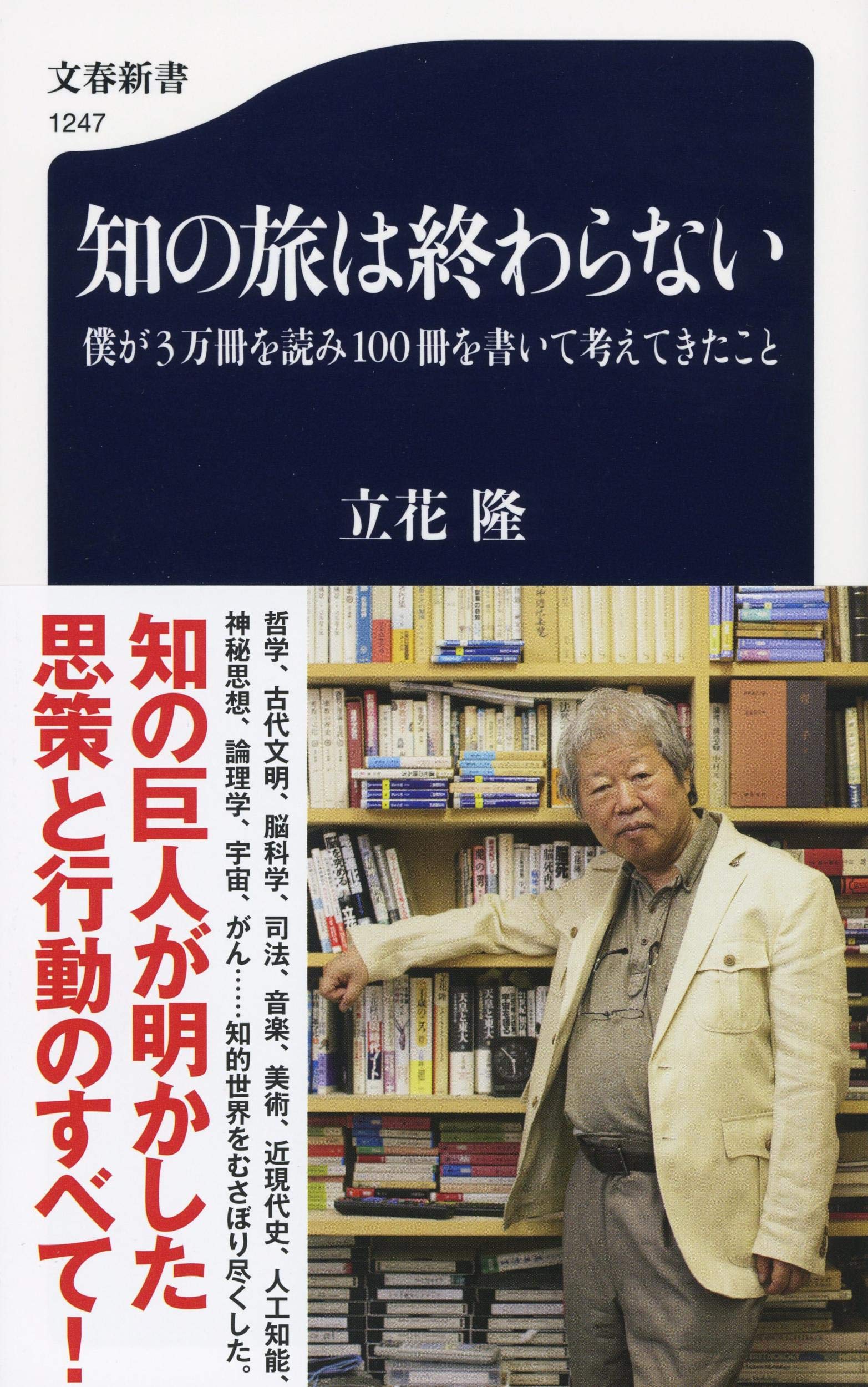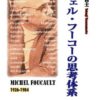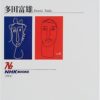立花隆は2021年04月30日に80歳で亡くなりました。『田中角栄研究』で角栄をやっつけてくれた人です(^_^;)。
彼の著作は何冊かもっていますが、ちゃんと読んだことはないかもしれません。亡くなったあとに1996年に放送された『NHK人間大学『知の現在 限りなき人間へのアプローチ』 立花隆』をYoutubeで観ました(約6時間)。すごい人です。とても私には真似ができないと思いました。
この本は100円ショップにいく途中の古本屋で税込み97円で入手しました。おもしろくて、415ページを一気に読んでしまいました。6時間位かかりました。誰かが、新幹線で大阪に行く間に新書1冊を読むのが丁度いい、と言っていましたが私は読むのが遅いんですね。
内容は、Youtubeとかぶっています。『人間大学』にない、幼い頃から大学生までの経験と、1996年以降2020年までのことも書かれています。
著者は「知の巨人」と言われました。「知」は「知識」でもあり、「知ることそのもの」でもあります。「知を希求し愛すること」、それは「φιλοσοφία」つまり、「哲学」にほかなりません。そして、それは「西洋哲学」です。「哲学」は「φιλοσοφία」の和訳だからです。だから、「東洋哲学」とか「インド哲学」とかいうのはおかしい。哲学そのものが、一種の思考形式なのです。
また「西周」です。私たちは、西周の手の中で思考しています。
私は、立花隆の思考をこそ哲学と呼びたいです。そういう意味では、西田幾多郎は「哲学者」ではありません。
立花の両親は「無教会主義のキリスト教徒」だったそうです。そして、彼自身はキリスト教徒ではない、と繰り返し書いてます。でも、それは彼が「日本人は仏教徒であることを意識していない」と言うのと同じ意味で「キリスト教徒」ではなく、かつ、キリスト教徒なのです。彼はヨーロッパ(及び中東)を巡って、「文化、歴史の厚み」に圧倒されます。そして、欧米の小説や文化はキリスト教の理解無くては理解できないと言います。私もそう思います。でも、私は「西洋哲学」を哲学だと思う程度には、西洋文化に冒されています。
ここでいう西洋文化というのは、キリスト教、イスラム教、ユダヤ教を含むものです。もっと広く「主体性の文化」あるいは「主語の文化」と言ってもいいでしょう。だから、立花の思想は哲学なのです。
それが明確に表れているのが、「サル学」です。マルクスは「人間の解剖は、猿の解剖のための一つの鍵である。」(『資本論草稿集』〈1〉P.58)と言いました。これこそがマルクスが突破できなかった、当のものだと思うのです。立花は「猿にも乱交がある」「レズビアンがある」ことを「知って」驚きます。彼はとっても素直です。「驚いたこと」「おかしいと思ったこと」「楽しいと思ったこと」を書く誘惑に逆らいません。猿の文化を人間の文化で説明しようとし、納得しようとします。説明できないこと、納得できないことは納得できるまで研究しようとするのが学者です。
マルクスは「より低級な動物種類にあるより高級なものへの予兆は、このより高級なもの自体がすでに知らされている場合にだけ理解することができる。こうしてブルジョア経済は、古代その他の経済への鍵を提供する。」(同、"Höhres、das Höhere"を「高級」と訳していいのかどうかはわかりません)と続けますが、晩年マルクスが乗り越えようとしていたのはこのことです。資本主義的生産関係が「高級」なもので、他の生産関係は「低級」なものであり、封建主義的生産関係から、ブルジョア革命を経て生産力を向上させ、社会主義革命によって資本主義的生産関係を破壊する、という視点はここから生まれます。進化論的な発想です。マルクスは『資本論』を書いている途中に迷ってしまいました。西洋的考え方からいえば「あたりまえ」のことです。自分が中心で、自分たちの社会が中心、人間・現在が発展の最高段階なのです。そして、未来はさらに発展した「高級」なものであり、それに較べると現在の人間や社会は「低級」です。だから、社会を変えなければいけない。変え続けるのが人間の運命なのです。
「猿」も「古代社会(文化・経済)」も「黒人」も「インデアン」も「英語やドイツ語を話す人」が「現在」から「解釈」できればいいのです。エンゲルスはそのことを貫いたし、レーニンは「そのほうが納得しやすい」と思っていたのではないでしょうか。マルクスの「ザスーリチへの手紙」の歯切れの悪さは、マルクスの困惑を表していると思うのです。
立花は「猿の気持ちよさ」がわかったのでしょうか。それを「知識」としたのでしょうか。それを「解釈」しようとしただけではないでしょうか。犬がしっぽをふるときや、植物が日光にあたったときの「よろこび」を立花は「知」ることができたのでしょうか。人間を、あるいは自分を主体として(主語として)対象を(述語として)語ること、知ること、それはまさしく「西洋の(キリスト教的な)」思考形式にほかなりません。
立花がエーゲ海諸国の遺跡で感じた文化の厚み、深遠さは「語ること」すら拒む「主客の垣根を超えた」ものだったはずです。だから、彼は『エーゲ 永遠回帰の海』を「自分が書いた本の中で一番気に入っている」し、たぶん、その発展形を本にしたかっただろうと思います。
でも、それを「本」つまり「文字」にしてはいけません。文字にすることによってそれは失われるからです。この本の最後に自分の未発表本リストの話が載っています。『形而上学』(metaphysics)はphysics(物理学)の「上に立つもの」で「だから僕は、現代のphysicsの最先端の知見に立ってmetaphysicsがあるべきだと以前から思っていたので、これを最後の本にするつもりでいます」(P.405-406)と言っています。その本は実現しませんでしたが、『エーゲ海・・』が文庫本化されたことのほうが大事でしょう。
実際は、のちに「形而上学」と言われる本が、他の本の上に置いてあっただけです。(^_^;)
いま、衆議院選挙の開票速報を観ながら書いています。自民党が安定多数をとったようです。立花はなんというでしょうか。立花にとって、政治や社会は「知の対象」にすぎません。自分が納得すればそれでいいのです。だから、『田中角栄研究』も『日本共産党の研究』も、そして『臨死体験』『宇宙からの帰還』も彼の中で同居できるし、捨てることすら可能なのです。立花は、日本の平和運動、議論の仕方、言論の自由の考え方等を指摘します。「投票に行こう」とマスコミは報じ続けました。民主主義や平等。それは西洋の「論理」「倫理」または価値観です。
昨日(日付が変わりました)、Twitterには投票のために列を作る人の写真が多く掲載されました。今日、「ジョーカー」のマネをした殺人未遂犯の映像が流れました。それをすぐに「可怪しい」と思ってしまう自分がいます。立花のように、素直に「対象を知ること」「対象化して〈知〉とすること」に「よろこび」や「生きがい」を感じることができるのはうらやましい気もするし、とても残念な気もするのです。
Takashi Tachibana died on April 30, 2021 at the age of 80. The person who defeated Kakuei in "Kakuei Tanaka Study" (^_^;).
He has several books, but he may not have read them properly. After his death, I watched "NHK Human University" Approach to the Present Endless Humans of Knowledge "Takashi Tachibana" on Youtube (about 6 hours). He is a great person. I thought he couldn't imitate me very much.
I got this book for 97 yen including tax at a second-hand bookstore on the way to a 100-yen shop. It was interesting and I read page 415 at once. It took about 6 hours. Someone said that it's best to read a new book while going to Osaka by Shinkansen, but I'm slow to read.
The content is wearing Youtube. Experiences from childhood to university students and from 1996 to 2020, which are not found in "Human University", are written.
The author was said to be the "Knowledge Giant." "Knowledge" is both "knowledge" and "knowledge itself". "Pursuing and loving knowledge" is nothing but "φιλοσοφία", that is, "philosophy". And that is "Western philosophy". This is because "philosophy" is a Japanese translation of "φιλοσοφία". Therefore, it is strange to say "Eastern philosophy" or "Indian philosophy". Philosophy itself is a form of thinking.
It is "Nishi Amane" again. We are thinking in the hands of Western Zhou.
I want to call Takashi Tachibana's thinking philosophy. In that sense, Kitaro Nishida is not a "philosopher."
Tachibana's parents were "non-church Christians." And he repeatedly writes that he is not a Christian himself. But it is not a "Christian" in the same sense that he says "Japanese are not aware that they are Buddhists," and they are Christians. He travels around Europe (and the Middle East) and is overwhelmed by the "thickness of culture and history." And he says that Western novels and cultures cannot be understood without an understanding of Christianity. I think so, too. However, I am affected by Western culture to the extent that I think "Western philosophy" is a philosophy.
Western culture here includes Christianity, Islam, and Judaism. It can be broadly referred to as "culture of independence" or "culture of subject". That is why Tachibana's thought is a philosophy.
This is clearly shown in "Pharmatology". Marx said, "Human anatomy is one of the keys to the anatomy of monkeys" ("Draft Collection of Capital Theory" << 1 >> P.58). I think this is exactly what Marx couldn't break through. Tachibana is surprised to "know" that "monkeys also have orgies" and "lesbians". He is very straightforward. He does not resist his temptation to write "surprise," "funny," and "fun." He tries to explain the monkey culture in human culture and try to convince him. Scholars try to study what they cannot explain and what they do not understand until they are satisfied.
Marx said, "The precursors to the higher ones in the lower animal species can only be understood if the higher ones themselves are already known. Thus the bourgeois economy goes to ancient and other economies. (I don't know if "Höhres, das Höhere" can be translated as "luxury"), but this is what Marx was trying to overcome in his later years. Capitalist relations of production are "high-class" and other relations of production are "low-grade". From feudal relations of production to bourgeois revolution, productivity is improved, and capitalist by socialist revolution. This is where the perspective of destroying relations of production comes from. It's an evolutionary idea. Marx got lost while writing "Das Kapital". From a Western point of view, it is "natural". You are the center, your society is the center, and human beings and the present are the highest stages of development. And the future is a more developed "high class", and in comparison, the present human beings and society are "low class". Therefore, we must change society. It is human destiny to keep changing.
It would be good if "monkeys", "ancient society (culture / economy)", "blacks", "Indians", and "people who speak English and German" could "interpret" from the "present". Engels did that, and Lenin thought, "It's easier to understand." I think Marx's crispness in Zasulich's "Letter to Zasulich" represents Marx's embarrassment.
Did Tachibana understand "the feeling of a monkey"? Did you call it "knowledge"? Didn't you just try to "interpret" it? Was Tachibana able to "know" the "joy" of when a dog wields its tail or when a plant is exposed to sunlight? Speaking and knowing a human being or an object (as a predicate) with oneself as the subject (as the subject) is nothing but a "Western (Christian)" way of thinking.
The depth and depth of culture that Tachibana felt at the ruins of the Aegean countries must have been "beyond the boundaries of the main customer" who refused to even "speak." So, he "likes the Aegean Sea of Eternal Return" "the most favorite book I've written," and I think he probably wanted to make a development of it.
But don't make it a "book" or "letter". Because it is lost by making it a letter. At the end of this book is the story of my list of unpublished books. "Metaphysics" is the "upper" of physics, "so I've always thought that metaphysics should be based on the cutting-edge knowledge of modern physics. Will be the last book "(P.405-406). The book didn't come true, but it's more important that "Aegean Sea ..." was made into a paperback book.
Actually, the book later called "Metaphysics" was just placed on top of other books. (^_^;)
I'm writing while watching the breaking news of the House of Representatives election. The Liberal Democratic Party seems to have taken a stable majority. What is Tachibana? For Tachibana, politics and society are nothing more than "objects of knowledge." If you are satisfied with it, that's fine. Therefore, "Kakuei Tanaka research", "Study of the Japanese Communist Party", "Near-death experience" and "Return from space" can live together in him, and can even be thrown away. Tachibana points out Japan's peace movement, the way of discussion, and the idea of freedom of speech. He continued to report, "Let's go to vote." Democracy and equality. It is Western "logic", "ethics" or values.
Yesterday (the date changed), Twitter posted a lot of pictures of people lining up for voting. Today, a video of an attempted murderer who imitated "Joker" was shown. Someone immediately thinks it is "suspicious". Like Tachibana, I feel envious and very disappointed that I can feel "joy" and "meaning of life" in "knowing the object" and "targeting it to" knowledge "". To do.
[著者等(プロフィール)]
立花/隆
1940年長崎県生まれ。64年東京大学文学部仏文科卒業後、文藝春秋新社入社。66年退社し、翌年東京大学文学部哲学科に学士入学。在学中から文筆活動を始める。74年『文藝春秋』に発表した「田中角栄研究―その金脈と人脈」は時の総理大臣を退陣に追い込み、社会に大きな衝撃を与えた。著書多数
『宇宙からの帰還』にはじまるサイエンスものでは、『サル学の現在』でサルと人間に細かく分け入り、『精神と物質 分子生物学はどこまで生命の謎を解けるか』でノーベル賞科学者の利根川進に綿密な取材を施し、『脳死』では安易な脳死判定基準に鋭く切り込んだ。科学を立花ほど非科学者の下に届けてくれた書き手はいない。浩瀚な書物である『ロッキード裁判とその時代』『巨悪vs言論』『天皇と東大』『武満徹・音楽創造への旅』は余人の及ばない仕事であり、また旅を語っても、哲学、キリスト教、書物を論じても冠絶しておもしろい。
立花隆はどのようにして出来上がったのか、そして何をしてきたのかーー。それに迫るべくして、彼の記憶の原初の北京時代から、悩み多き青春期、中東や地中海の旅に明け暮れた青年期、膀胱がんを罹患し、死がこわくなくなった現在までを縦横無尽に語りつくしたのが本書である。彼が成し遂げた広範な仕事の足跡をたどることは、同時代人として必須なのではないだろうか。



